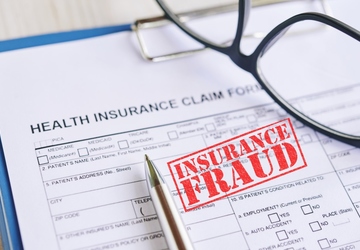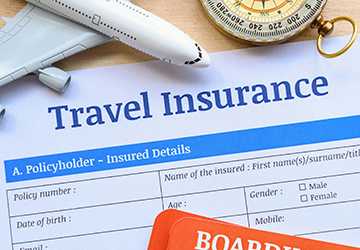In the world of insurance, it can feel like wading through a maze of policies, premiums, and paperwork. It’s a landscape designed to provide security when needed, but unfortunately, it also provides fertile ground for scammers who want to take advantage of the unsuspecting.
In the world of insurance, it can feel like wading through a maze of policies, premiums, and paperwork. It’s a landscape designed to provide security when needed, but unfortunately, it also provides fertile ground for scammers who want to take advantage of the unsuspecting.
In this guide, we’ll look at 10 insurance scammers, reveal their fraud tactics, and most importantly, how to protect yourself from them. From fake insurance policies to unnecessary upgrades, every scam is a potential roadblock to your path to financial security. So, let’s uncover these scams and gain the knowledge to outwit the fraudsters lurking in the shadows of the insurance world. Let’s uncover ten of the most common insurance scams and arm yourself with the knowledge on how to stay away from them.
1. Virtual policy

Imagine paying for a policy that doesn’t exist. A bogus policy is a scam in which a scammer poses as a legitimate insurance agent and sells a policy that is nothing more than a piece of paper. They will disappear along with your winnings, leaving you with a false sense of security.
How to avoid it: Always check the legitimacy of the insurance agent and the company he represents. Search for a license, read reviews and never pay with cash. If a deal seems too good to be true, it probably is.
2. Staged accidents
In the world of insurance fraud, carefully planned accidents take center stage. Scammers will stage accidents to make it appear you were at fault and exaggerate damage and injury claims. These scams can result in higher premiums for innocent policyholders.
How to avoid it: Keep a safe distance, record your trip with a dash cam and report suspicious behavior to the police immediately. Thoroughly document the accident scene, including photos and witness statements, to protect yourself against fraudulent claims.
3. False claims
Some scammers take advantage of the confusion surrounding soft tissue injuries, reporting injury claims that may not even exist. From neck pain to back pain, these fraudulent claims can increase anyone’s insurance bill.
How to avoid it: If an accident occurs, do not admit fault and seek medical attention immediately if necessary. Be careful if someone pressures you to see a specific doctor or chiropractor. Document the injury with photos and report any discrepancies to your insurance company.
4. Door-to-door repair scams
Natural disasters can bring out the best in people, but unfortunately, they also attract unscrupulous individuals who want to profit from the misfortunes of others. After a disaster, fake contractors may offer quick repairs while taking your insurance money without completing the work.
How to avoid this: Always check a contractor's qualifications, ask for references, and get multiple quotes before committing. Be wary of pressure tactics and never pay the full amount up front. Before authorizing any repairs, check online reviews and contact your insurance company.
5. Identity Theft in Insurance
Identity theft is more than just stealing money from your bank account. Scammers can use your personal information to submit false insurance claims in your name, leaving you to face the consequences.
How to avoid it: Regularly check your insurance statements for any unusual activity. Protect personal information, destroy confidential documents, and use strong passwords. If you notice any discrepancies, report them to your insurance company immediately.
6. Unnecessary upgrades
Some repair shops may try to convince you to upgrade your vehicle parts to premium options when filing a claim. They may insist that this is necessary for safety reasons, or that your insurance will cover it. This allows them to charge exorbitant fees and profit from unnecessary upgrades.
How to avoid it: Before approving a repair, get a second opinion from a trusted mechanic. Familiarize yourself with your policy, understand what is covered, and question any recommended upgrades that seem excessive. If you feel pressured into unnecessary spending, don't be afraid to say no.
7. Ghost Brokers
A ghost broker acts as a middleman between you and the insurance provider and promises discounted rates. They may sell false policies or manipulate information to lower premiums, leaving you uninsured and at risk.
How to avoid it: Contact a reputable insurance company or licensed agent directly. Verify the legitimacy of a broker by checking their credentials and confirming their relationship with a recognized insurance provider. Be skeptical of quotes that seem too good to be true, and always check policy details with the insurance company.
8. Vacant Property Fraud
If you own a vacant property, you should be wary of scammers who may pose as potential tenants or caretakers. You can intentionally cause property damage and then file a claim with your insurance company.
How to avoid it: Vet potential tenants or caregivers thoroughly by checking references and conducting background checks. Install security measures such as alarms or cameras to deter potential scammers. Inspect your property regularly and document its condition with photos so you have evidence in the event of a dispute.
9. Medicare/Medicaid Fraud

Health insurance fraud, particularly as it relates to Medicare and Medicaid, is on the rise. Scammers may charge for services that are never provided, or for unnecessary and expensive procedures.
How to avoid it: Check your Medicare or Medicaid bill regularly for any discrepancies. Be wary of medical providers who offer free services or equipment in exchange for your insurance information. Report any suspicious activity to the appropriate authorities and your insurance company.
10. Fake travel insurance
When booking travel, scammers may offer travel insurance that looks affordable but actually offers little protection. When it comes time to file a claim, you discover that you have been scammed and your costs have not been reimbursed.
How to avoid it: Buy travel insurance from a reputable, well-known provider. Read the policy terms and conditions carefully to understand coverage limitations and exclusions. Be wary of offers that are much cheaper than the average market price, as they may seem too good to be true. In the ever-evolving world of insurance fraud, knowledge is your greatest ally. Stay informed, question anything that seems fishy, and remember that a healthy dose of skepticism can go a long way toward protecting yourself from financial pitfalls.
Conclusion
Staying vigilant is key to avoiding insurance fraud. Examine, document, and be skeptical of anything that seems too good to be true. By arming yourself with knowledge, you can not only protect your finances but help create a more honest and transparent insurance environment for everyone. Stay safe, stay informed, and let’s outsmart the scammers together.
-
![Top 10 Insurance Tips for New Homeowners]()
- Top 10 Insurance Tips for New HomeownersWhen you're independent enough, you want to have your own home, whether an apartment or a suburban one. It's about the American Dream and enjoying the benefits of being independent. However, due to the recent increase in property and construction prices since Covid and current inflation, it can be expensive to come home and repair. Things get even more complicated when a natural disaster or unforeseen event damages your home. Reviewing or obtaining insurance is more important than ever. That's why we've put together some tips for new homeowners.









